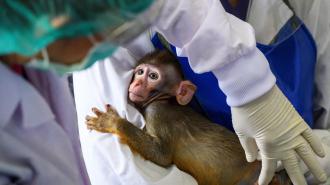A monkey survived for more than two years with a kidney from a gene-edited pig, according to a new study.
It’s a dramatic example of a new technology that could help save countless lives, but the two-year survivor had the best outcome of the 15 monkeys in the study — the median survival time was about 6 months after transplantation.
Xenotransplantation 101: Of the 104,000 Americans on the waiting list for an organ transplant, about 6,200 are going to die this year because they didn’t get the life-saving organ they needed in time.
One of the most promising solutions to this organ shortage is also one of the most sci-fi: xenotransplantation. This means taking organs from one species (like a pig) and transplanting them into another (like humans). And after decades of trying it — and failing — researchers are finally starting to see some success, thanks to gene editing.
More than 85% of the people on the US transplant waiting list need new kidneys.
Using technology like CRISPR, they’re making precise changes to the DNA of pigs to make their organs more likely to be accepted by the human body.
Last year, a man with terminal heart disease, who didn’t qualify for a human transplant, lived for two months after receiving a heart transplant from a gene-edited pig — and another man has now lived for three weeks (and counting) with a heart from a similar gene-edited pig beating in his chest.
Pig hearts have also functioned normally for several days in the bodies of two people who were brain dead at the time of the transplant, thanks to their families’ decision to donate their bodies for scientific research. Kidneys from gene-edited pigs have also worked for as long as 61 days when transplanted into the bodies of people who were brain dead.
What’s new? These are promising developments, but getting organs from other species to function for years is the ultimate goal. On October 11, biotech company eGenesis published a study showing that we may be on the cusp of reaching it.
eGenesis researchers made 69 edits to the genomes of pigs to make their organs more likely to function long term in people: 3 edits knocked out pig genes, 7 edits added human genes, and the rest disabled latent pig viruses.
(These are viruses that have permanently embedded themselves into the pig genome, and are mostly but not entirely inactive — humans have lots of these ourselves, but latent viruses from another species may be more likely to cause complications.)
“We anticipate that transplant outcomes in humans will be even more favorable.”
Tatsuo Kawai
When they transplanted kidneys from the gene-edited pigs into 15 monkeys who’d had their own kidneys removed, 9 of the monkeys lived for at least 50 days. Five of those monkeys lived for at least a year, and one of them lived for 758 days. The median survival time was 176 days.
“We anticipate that transplant outcomes in humans will be even more favorable, as these gene-edited organs are a better match for humans, as compared with [non-human primates],” said study co-author Tatsuo Kawai, a professor of surgery at Harvard Medical School.
Not quite record-breaking: According to Michael Curtis, eGenesis’s chief executive, monkeys have survived longer than 758 days with pig kidneys, but those results were only achieved if the animals’ immune systems were severely suppressed.
“Longer survival has been achieved with much more aggressive suppression that really isn’t clinically translatable,” he said during a press briefing. “The key here is that we’re achieving long-term graft survival with a clinically translatable suppression, which is incredibly important.”
The cold water: While getting a pig kidney to work in a monkey for more than two years is impressive, most of the animals in the trial died within a year.
Kidneys from human donors typically last 20-25 years, so much more work is needed to ensure a person doesn’t end up right back on the organ transplant waiting list after undergoing xenotransplantation surgery.
“We’re achieving long-term graft survival with a clinically translatable suppression.”
Michael Curtis
Looking ahead: More than 85% of the people on the US transplant waiting list need new kidneys, making them the most sought-after organs by far, so if we can source them from gene-edited pigs, the impact would be huge.
While eGenesis isn’t done with the preclinical phase of research just yet, Curtis told the Guardian that the results of this primate study put it closer to satisfying the FDA’s requirements for a clinical trial.
“We are well on our way there,” said Curtis. “There simply aren’t enough kidneys to go around. In our opinion it’s the only near-term viable solution.”
We’d love to hear from you! If you have a comment about this article or if you have a tip for a future Freethink story, please email us at tips@freethink.com.
